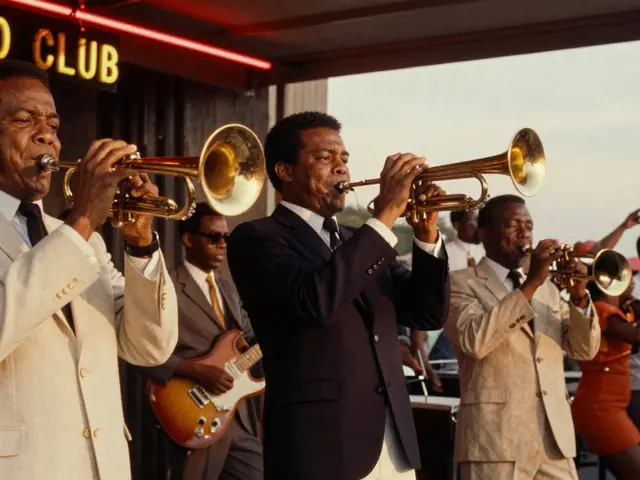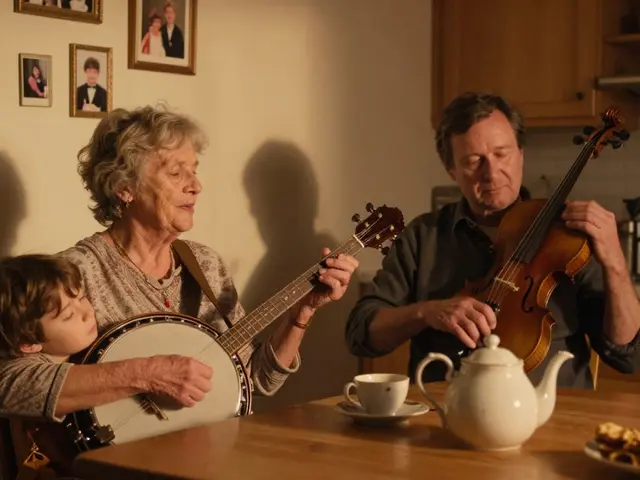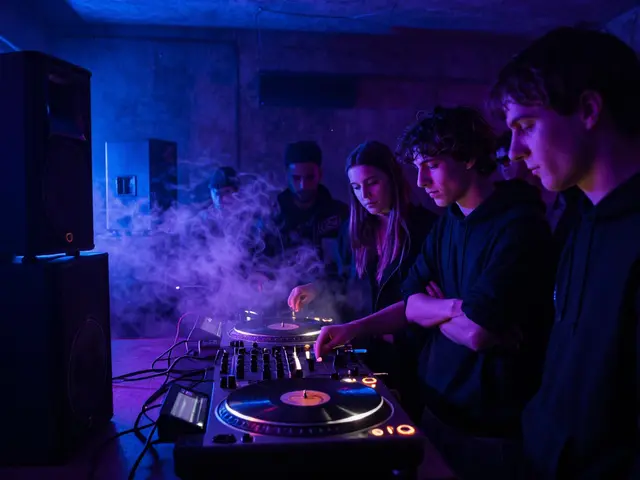The profound echoes of blues music carry tales of struggle, hope, and an unyielding human spirit. Born from the heart of the Mississippi Delta, this evocative genre encapsulates a deep narrative woven from the African American experience. Its sound is a compelling mix of sorrowful notes and heartfelt lyrics, resonating with listeners across generations.
From its humble beginnings in the late 19th century, blues has been a major driver in shaping the musical landscape. Its raw emotion and simplicity have laid the groundwork for countless other genres. Today, it’s not hard to trace the influence of blues in rock, jazz, and even hip-hop, making it a timeless mainstay in the realm of music.
Join us as we delve into the world of blues music, exploring its origins, impact, and the artists who have kept its spirit alive. Whether you're a long-time fan or a newfound listener, there's always something new to discover about this powerful genre.
- Origins and History
- Influence on Other Genres
- Notable Blues Artists
- Blues in Contemporary Music
- The Emotional Connection
Origins and History
The story of blues music commences in the late 19th century, emerging from the rich cultural tapestry of African American communities in the Deep South in the United States. Rooted in the spirituals, work songs, and field hollers of enslaved people, the blues gave voice to the pain and hardships endured during and after the slavery period. These early songs were often performed with minimal instrumentation, sometimes just a lone guitar accompanying a mournful vocal line, reflecting both the scarcity and simplicity of the lives of its creators. Yet, this somber music also carried with it a profound sense of resilience and hope, offering solace in times of despair.
One of the significant milestones in the rise of blues was its formal recognition as a distinct musical genre. This happened notably around the turn of the 20th century when composers and performers began to document and publish blues compositions. This period saw the emergence of the “Mississippi Delta Blues,” characterized by the use of the blues scale and improvisation, which became the most influential form and an early prototype of the genre that we identify today. Rural blues musicians like Charley Patton and Robert Johnson became legendary figures, whose haunting melodies and intricate guitar techniques laid the foundation for future generations.
Interestingly, the term “blues” itself is believed to have been derived from the English phrase “blue devils” — meaning sadness or melancholy, though its exact origins are somewhat veiled in mystery. Despite its somber themes, the blues offered more than just a reflection of life's hardships. It provided a sense of community and connectivity among African Americans, especially in a segregated society where such music gatherings often served as escapes from the restrictions of everyday life. Blues clubs and juke joints were sanctuaries where their stories could be shared and collective experiences celebrated through music and dance.
With the migration of African Americans from southern states to the urban centers in the north during the Great Migration in the early 20th century, blues music found new audiences and mediums. This movement led to the birth of what we now call the “Chicago Blues,” where artists like Muddy Waters and Howlin’ Wolf infused traditional Delta blues with the electric sound, transforming it into a dominating force in the burgeoning music industry. Such artists found themselves at home in bustling, multicultural cities where they could reach a broader audience through radio and, later, television. This period marked a significant evolution in the sound and commercial potential of blues music, expanding its influence not only across the United States but globally as well.
The great bluesman B.B. King once poignantly remarked, "The beautiful thing about learning is nobody can take it away from you." His words reflect the deeper cultural significance of blues as both a historical archive and a relentless teacher for those who would follow in its path.
The enduring legacy of blues music is visible in its influence on numerous other genres, from rock and roll to jazz, and even modern hip-hop. The adaptability and emotive versatility of the blues have ensured its survival and relevance, turning it into a universal language that resonates with people from all walks of life. As we look back on its origins and history, we recognize blues as more than just a genre; it is a testament to human resilience and the power of music to heal and unify.
Influence on Other Genres
The reach of blues music is vast and, undeniably, profound. Its presence can be marked as a cornerstone in the foundation of many popular music genres we enjoy today. With its characteristic 12-bar progression, the blues has provided a template that has been adapted and interpreted in myriad ways. From the electric blitz of rock 'n' roll to the soulful grooves of rhythm and blues, the footprint of blues is everywhere.
One of the most prominent genres that owes a great deal to blues music is rock. Pioneers such as Elvis Presley and the Rolling Stones drew heavily from blues influences, integrating its distinctive licks and heartfelt, gritty expressions into their sound. As Keith Richards once noted, "If you don't know the blues… there's no point in picking up the guitar and playing rock and roll or any other form of popular music."
A famous quote from Richards highlights the symbiotic relationship between blues and rock: "The blues are what I've turned to, what has given me inspiration, and relief, in all the trials of my life," reflecting the genre's deep emotional impact.
Jazz, known for its improvisational flair and complex harmonies, also holds tight to its blues roots. Early jazz musicians, including Louis Armstrong and Duke Ellington, intertwined blues scales and motifs into their compositions, creating layers of depth and emotion that set the stage for the bebop and swing movements. The blues scales' expressive bends and slides gave jazz players a new palette of emotional expression.
The impact extends beyond just rock and jazz. In the realm of hip-hop, the blues ethos of storytelling through music resonates deeply. Hip-hop artists often channel the blues’ themes of hardship and resilience, creating narratives that echo the struggles depicted in early blues songs. These lyrical parallels are complemented by production choices that sometimes sample blues tracks, intertwining the old with the new.
Even contemporary pop draws from blues influences. Artists across decades have borrowed the emotional heft and structural simplicity of blues to craft hits that resonate on the charts. The blues' emphasis on personal narrative and emotional authenticity continues to inform songwriting techniques in pop music. This convergence of blues with other styles demonstrates the genre's versatility and enduring appeal.
A deeper insight into the breadth of blues influence can be seen in the way music festivals worldwide often showcase blues acts alongside rock, jazz, and alternative bands. This cross-genre appreciation highlights the universal chord that blues strikes, reaffirming its role as a vital cultural and musical force.
In essence, blues music has transcended its origins, permeating nearly all corners of the musical world. Its profound influence has equipped artists with new tools for expression, allowing them to forge connections with listeners across diverse genres. This cross-pollination underscores a universal truth: the human spirit, in all its experience, finds an echo within the soul of the blues.

Notable Blues Artists
Blues music, with its rich tapestry of emotions, is often defined by the artists who have masterfully brought it to life. These musicians are storytellers, weaving narratives filled with both hardship and hope, setting them to a rhythm that has echoed through time. Their contributions have cemented the genre as an integral part of music history. Among these legends, names like B.B. King, Muddy Waters, and Robert Johnson stand out, not only for their music but also for their influence on countless artists across various genres. B.B. King, known as the 'King of Blues,' transformed the landscape with his guitar prowess and soulful voice. His unique style, blending vibrato with complex soloing, became a template for aspiring guitarists. Muddy Waters, often credited with 'inventing' the electric blues, carried the music from the plantations of the South to the urban crowds of Chicago, amplifying it in both volume and impact. His signature slide guitar technique and deep, resonant voice have left an indelible impression on rock and blues genres. Robert Johnson, cloaked in myth and mystery, is often hailed as the 'grandfather' of blues. Despite recording only 29 songs, his intense, haunting style, combined with lyrics that spoke of love, betrayal, and the supernatural, laid the groundwork for future blues and rock musicians, inspiring legends like Bob Dylan and Eric Clapton. Indeed, Eric Clapton once noted, "I have never found anything more deeply soulful than Robert Johnson's music."
In addition to these towering figures, there are countless other artists who have shaped the world of blues. Willie Dixon, a true renaissance man of blues, was a prolific songwriter, instrumentalist, and producer whose work has been covered by numerous rock bands. His compositions, including classics like "Hoochie Coochie Man" and "I Can't Quit You Baby," are staples in the blues repertoire. Another pivotal figure, Howlin' Wolf, was known for his ferocious performances and a voice that seemed to reverberate through every song. His collaboration with guitarist Hubert Sumlin created some of the most iconic blues recordings, infusing raw power with visceral emotion. Female artists, too, have left an indelible mark on blues. Big Mama Thornton, with her commanding presence and blues-infused rock sound, paved the way for powerful performances, inspiring artists far beyond her own genre. Koko Taylor, dubbed the 'Queen of the Blues,' brought grit and authenticity to every note she sang, capturing the essence of Chicago blues in her career-spanning decades.
There's a vast array of blues musicians whose styles and innovations have carried the genre through changing times, adapting and evolving while remaining true to its core essence. Today, contemporary artists continue to draw from the blues wellspring, reshaping it to fit modern sensibilities. This table highlights a few timeless icons whose legacy continues to inspire new generations:
| Artist | Signature Song | Influence |
|---|---|---|
| B.B. King | The Thrill Is Gone | Electric blues, guitar solos |
| Muddy Waters | Hoochie Coochie Man | Urban electric blues |
| Robert Johnson | Cross Road Blues | Mythical narrative, guitar mastery |
| Willie Dixon | Little Red Rooster | Songwriting, lyrical themes |
| Howlin' Wolf | Spoonful | Vocal power, emotive stage presence |
In the world of blues music, these artists remain cornerstones, their music not just lasting footnotes in history but living, breathing entities that continue to speak to the human condition. Whether through the resonating, sweetly sorrowful tunes of B.B. King or Robert Johnson's haunting legacy, the blues is always present, inviting new listeners to feel its rhythm.
Blues in Contemporary Music
The tenacious spirit of blues music carries forward powerfully into the contemporary music scene, offering influence and inspiration that is both palpable and vast. In today's diversified musical landscape, blues remains a potent force, subtly embedded within the very fabric of numerous modern genres. Its simplicity and emotional honesty resonate profoundly, creating a sense of grounding and authenticity many artists strive for in their work.
Modern day musicians have deftly woven the haunting melodies and poignant themes of blues into their creations, often using it as a foundation to build upon. Artists, both new and seasoned, draw extensively from the rich tapestry of blues sounds to infuse their own music with depth and complexity. Even those who play in genres like rock, pop, and even country often find themselves indebted to the influence of blues. Bands such as The Rolling Stones and artists like Gary Clark Jr. hold blues at the core of their performances, echoing its rhythms and structures amid more contemporary styles.
Many iconic blues festivals continue around the world, keeping the spirit alive and exposing new audiences to its timeless power. Festivals like the Chicago Blues Festival serve as a testament to its ongoing influence, featuring both classic blues artists and modern musicians who exemplify the genre's spirit in new ways. These gatherings champion the enduring legacy of blues, fostering a sense of community and continuity between the past and the present. The Blues Foundation, with its Blues Music Awards, also plays a significant role in maintaining and promoting this heritage.
Even in the digital age, the soulful strains of blues resonate across platforms, reaching younger audiences and finding new expression in collaborations. Streaming services allow the vast array of blues history to be accessed more widely than ever before, leading to a resurgence in interest among younger generations. Its themes of overcoming adversity, heartbreak, and the celebration of life continue to thread through the music of diverse artists, from folk singers to hip-hop legends. With a deep-seated emotional connection and universal appeal, blues remains not only relevant but also essential to the contemporary soundscape.
"The blues is the foundation and the structure, and the great thing about it is how elastic it is; it can take on many forms from rock to jazz, or even be the underpinning of hip-hop." - Tim Riley
In concert with technological advancements, many musicians have found innovative ways to marry traditional blues with modern soundscapes, creating something uniquely fresh yet deeply anchored in history. Collaborations between blues musicians and electronic artists exhibit this fascinating blend, creating rich, textured music that is rejuvenating an age-old art form. Through its intrinsic link to the human experience and adaptability, blues continually affirms its place within, and its endless contributions to, contemporary music.

The Emotional Connection
Few musical genres elicit as profound an emotional reaction as blues music. This genre is not merely a collection of melodies and harmonies; it is a powerful storyteller, a soul's chronicler. At its core, blues music reflects the bittersweet essence of human experience, capturing life's lowest lows and highest highs. It stems largely from the African American history of suffering, survival, and resilience against adversity, giving it an authentic resonance that speaks volumes to anyone who listens. The simplicity of its twelve-bar structure amplifies its emotional impact, creating a rawness and intimacy often unparalleled in other forms of music.
The allure of blues music lies in its capacity to articulate feelings that many people find challenging to verbalize. Its lyrics often weave personal narratives of heartache, lost love, and existential musings, transforming private pain into a shared human experience. This cathartic process is why so many listeners feel a deep connection to blues; it resonates with their own struggles and triumphs. The blues offer not just a mirror to one’s sorrow but also a pathway to healing. It's no wonder that blues clubs, scattered around the globe, serve as communal sanctuaries where people gather to both reminisce and rejoice through the universal language of music.
"Blues is a tonic for whatever ails you. I could play the blues and then not be blue anymore." - B.B. King
This quote by the legendary blues artist B.B. King beautifully encapsulates the therapeutic power of the genre. The ability of blues music to inspire a wide range of emotions is also reflected in its influence across various other musical styles. From rock giants like Eric Clapton and The Rolling Stones to jazz icons such as John Coltrane, many musicians have cited the profound emotional depth of blues as a critical influence in their development. By tapping into this river of emotional truth, artists craft music that feels genuine and timeless, continuously drawing new listeners into its embraces.
Interestingly, studies have shown that listening to blues can affect the brain's chemistry positively, similar to the effects enjoyed by those who participate in group therapy sessions. This genre’s unique combination of lyrical melancholy with rhythmic complexity triggers a release of endorphins—the body’s natural feel-good chemicals—helping listeners to relax and feel emotionally validated. As people continue to explore these spiritual melodies and heartfelt stories, the bond between the audience and blues remains unbroken, not just as a form of entertainment but as a vital emotional outlet.






